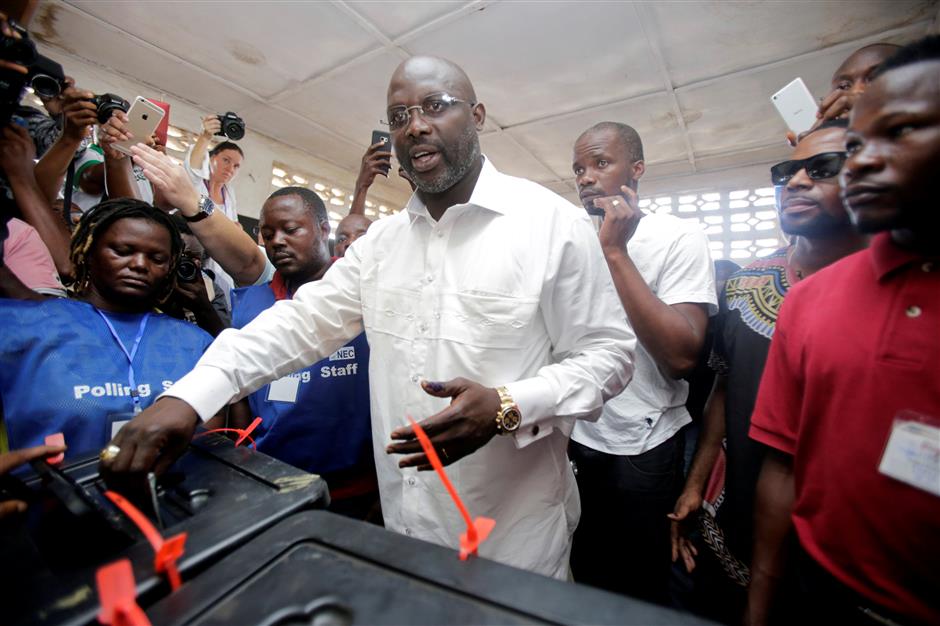Liberians want peace after years of civil war

George Weah, former soccer player and presidential candidate of Congress for Democratic Change (CDC), votes at a polling station in Monrovia, Liberia, October 10, 2017.
Thousands lined up at polling booths in Liberia’s capital on Tuesday for their first democratic transfer of power in 73 years in a vote haunted by a savage civil war that ended in 2003.
Many Liberians on Tuesday praised 78-year-old Nobel Peace Prize winner Ellen Johnson Sirleaf for keeping peace since the dark days of the 14-year conflict when gangs of drugged child soldiers wearing ammunition belts marauded through the streets.
Yet, while preparations have been peaceful, a former rebel leader Prince Johnson is one of the 20 candidates and an ex-wife of warlord Charles Taylor, now in a British jail, is the running mate of one of the favorites, former soccer player George Weah.
Unlike neighboring Sierra Leone which had a U.N.-backed court for civil war crimes committed in both countries, Liberia has prioritised reconciliation over justice and some of those involved in the war that killed a quarter of a million people are still prominent public figures.
“I am just voting for peace. We want peace right now, peaceful country, we want a peaceful situation now and things to go fine,” said James Marthics, a voter in Paynesville, a suburb of the capital Monrovia.
Some had been waiting for hours before dawn to vote and brought small wooden chairs with them, forming orderly queues as vendors sold them soft drinks and palm wine.
“I have come to vote for a change. I want to be a part of history making today,” said Edward Cooper, a retired rubber plantation worker, shortly before the polls opened.
No electricity
Johnson Sirleaf, Africa’s first female president and an ally of the United States, in an address to the nation on the eve of the vote urged Liberians to maintain the peace. “Embrace your neighbor, regardless of their political choice,” she said.
Liberia is one of Africa’s oldest states founded by freed US slaves in the 19th century. But its last democratic power transfer, defined as a peaceful handover at the end of a full term, was in 1943.
Johnson Sirleaf beat Weah to win the election in 2005 after a period of transitional government following the civil war that ended two years earlier.
Most analysts think it is unlikely that any single candidate will win a majority in a single round this time, forcing a second one some time in early November. Results are expected to begin arriving later this week.
Among the favorites are Vice President Joseph Nyuma Boakai of the ruling Unity Party; Weah, who played for AC Milan and Paris St Germain, among other clubs; and Alexander Cummings of the Alternative National Congress.
Rebel leader Johnson, who famously held a beer as he watched a tape of his supporters murdering President Samuel Doe in 1990, is considered to have only an outside chance.
And Roddy Barclay, director at risk advisory Africa Practice, said the participation of civil war-era figures was unlikely to lead to a “slide back into an era of warlord politics”.
As well as her role in keeping the peace, Johnson Sirleaf is held in high esteem internationally for promoting women’s rights and for respecting the constitution in a continent where many leaders cling to power beyond their legal tenure.
But many at home, who call her simply “Ellen”, say they are disappointed she has not done more to accelerate development and end corruption in a country still ranked near the bottom of the U.N. human development index at 177 out of 188 countries.
One polling station in Monrovia had no electricity and officials had to use flashlights to illuminate voter lists in the early morning light, a Reuters witness said.
Others blame her for the legacy of a weak health care system which has still not fully recovered after the 2014-2016 Ebola epidemic that killed more than 4,000 people in Liberia.
“We don’t feel free because the children are not going to school,” said Emma Nathaniel, a 60-year-old widow with 12 children. “We are straining ourselves,” she said from the voting queue, surrounded by piles of garbage.















